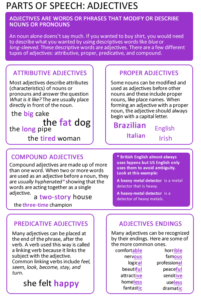
Parts of Speech: Adjectives
A noun alone doesn’t say much. If you wanted to buy shirt, you would need to describe what you wanted by using descriptive words like blue or long-sleeved. These descriptive words are adjectives. There are a few different types of adjectives: attributive, proper, predicative, and compound.
Attributive Adjectives:
Most adjectives describe attributes (characteristics) of nouns or pronouns and answer the question What’s it like? They are usually placed directly infornt of the noun. Look at these examples:
The big cake. The fat dog. The long pipe. The tired woman.
Proper Adjectives:
Some nouns can be modified and used as adjectives before other nouns and these include proper nouns, like place names. When forming an adjective with a proper noun, the adjective sould always begin with a capital letter. Look at these common examples:
Brazilian. English. Italian. Irish.
Compound Adjectives:
Compound adjectives are made up od more tha one word. When two or more words are used together as an adjective before an noun they are usually hyphenated to show that the words are acting together as a single adjective.
A two-story house. A three-time champion.
British English almost always uses a hyphen, but US English only uses a hyphen to avoid confusion. Look at these examples:
- A small car factory – a small factory that makes cars. Because there is no hyphen we can see that both small and car are adjectives that modify factory.
- A small-car factory – a factory that makes small cars. Because of the hyphen small and car are working together to modify factory.
Predicative Adjectives:
Many adjectives can be placed at the end of the phrase, after the verb. The verb in this case is a linking verb because it links the subject with the adjective. Common linking verbs are: is, look, feel, seem, become, stay, and turn.
She looks sick. They felt great. The door is white.
Adjective Endings:
Many adjectives can be recognized by their endings. Here are some of the more commone ones:
comfortable attractive nervous logical beautiful useless fantastic
horrible sensitive famous professional peaceful homeless dramatic
